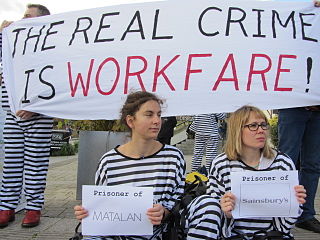Related Research Articles

Unemployment, according to the OECD, is persons above a specified age not being in paid employment or self-employment but currently available for work during the reference period.

The Solidarity Federation, also known by the abbreviation SolFed, is a federation of class struggle anarchists active in Britain. The organisation advocates a strategy of anarcho-syndicalism as a method of abolishing capitalism and the state, and describes itself as a "revolutionary union". In 1994 it adopted its current name, having previously been the Direct Action Movement since 1979, and before that the Syndicalist Workers' Federation since 1950.
Unemployment benefits, also called unemployment insurance, unemployment payment, unemployment compensation, or simply unemployment, are payments made by authorized bodies to unemployed people. In the United States, benefits are funded by a compulsory governmental insurance system, not taxes on individual citizens. Depending on the jurisdiction and the status of the person, those sums may be small, covering only basic needs, or may compensate the lost time proportionally to the previous earned salary.
The New Deal was a workfare programme introduced in the United Kingdom by the first New Labour government in 1998, initially funded by a one-off £5 billion windfall tax on privatised utility companies. The stated purpose was to reduce unemployment by providing training, subsidised employment and voluntary work to the unemployed. Spending on the New Deal was £1.3 billion in 2001.
Workfare is an alternative, and controversial, way of providing money to otherwise unemployed or underemployed people, who are applying for social benefits. The term was first introduced by civil rights leader James Charles Evers in 1968; however, it was popularized by Richard Nixon in a televised speech August 1969. An early model of workfare had been pioneered in 1961 by Joseph Mitchell in Newburgh, New York.
Work for the Dole is an Australian Government program that is a form of workfare, or work-based welfare. It was first permanently enacted in 1998, having been trialled in 1997. It is one means by which job seekers can satisfy the "mutual obligation requirements" to receive the Newstart Allowance, now replaced by the JobSeeker Payment. Other "mutual obligation" measures can include: accredited study, part-time work, Australian Army Reserves, and volunteer work.
Incapacity Benefit was a British social security benefit that was paid to people facing extra barriers to work because of their long-term illness or their disability. It replaced Invalidity Benefit in 1995. The government began to phase out Incapacity Benefit in 2008 by making it unavailable to new claimants, and later moved almost all the remaining long-term recipients onto Employment and Support Allowance.

Working Links was a British outsourcing subcontractor established in 2000 as a public, private and voluntary company that provided welfare services and help with employability. It was acquired by the investment group Aurelius in June 2016.

Youth unemployment in the United Kingdom is the level of unemployment among young people, typically defined as those aged 18–25. A related concept is graduate unemployment which is the level of unemployment among university graduates. Statistics for June 2010 show that there are 926,000 young people under the age of 25 who are unemployed which equates to an unemployment rate of 19.6% among young people. This is the highest youth unemployment rate in 17 years. In November 2011 youth unemployment hit 1.02 million, but had fallen to 767,000 by August 2014. The high levels of youth unemployment in the United Kingdom have led some politicians and media commentators to talk of a "lost generation".
The California Work Opportunities and Responsibility to Kids (CalWORKs) program is the California welfare implementation of the federal welfare-to-work Temporary Assistance for Needy Families (TANF) program that provides cash aid and services to eligible needy California families.

R v Secretary of State for Work and Pensions [2013] UKSC 68 is a United Kingdom constitutional law and labour law case that found the conduct of the Department for Work and Pensions "workfare" policy was unlawful. Caitlin Reilly, an unemployed geology graduate, and Jamieson Wilson, an unemployed driver, challenged the Jobcentre policy of making the unemployed work for private companies to get unemployment income. The outcome of the case affects over 3,000 claimants and entails around £130m unpaid benefits.
Mandatory Work Activity (MWA) was a workfare programme in the United Kingdom whereby individuals had to work for their benefits or risk being 'sanctioned' and losing them. MWA started in May 2011, but in November 2015 the DWP confirmed it was "not renewing" it. An academic analysis by the Department of Work and Pensions cast doubt on the effectiveness of MWA, and despite finding "little evidence" that workfare improved claimants gaining paid employment, the DWP ignored the findings of the study, and in June 2012, the scheme received a £5m expansion. A similar but little-known scheme 'Jobseeker Mandatory Activity' (JMA) was piloted by New Labour in 2006, but did not last beyond 2008. JMA targeted those claimants 25 and over, who had been unemployed for 6 months or more and made claimants liable to 'sanction' for non-compliance.
Boycott Workfare is a British campaign group that has opposed "workfare" policies in the United Kingdom. The group's campaigning has been very successful in making companies and charities pull out of "workfare". In January 2014 the group lodged freedom of information requests to investigate the use of workfare by local government. This led to responses from 271 councils, and the results were 62% of them had used unpaid workers during the past two years. This amounted to more than half a million hours of unpaid labour. As of August 2016, more than 50 organisations have ended their involvement in workfare, because of negative publicity.

In the United Kingdom, "workfare" refers to government policies whereby individuals must undertake work in return for their benefit payments or risk losing them. Workfare policies are politically controversial. Supporters claim that such policies help people move off welfare and into employment whereas critics argue that they are analogous to slavery or indentured servitude and counterproductive in decreasing unemployment.
The Work Programme (WP) was a UK government welfare-to-work programme introduced in Great Britain in June 2011. It was the flagship welfare-to-work scheme of the 2010–2015 UK coalition government. Under the Work Programme the task of getting the long-term unemployed into work was outsourced to a range of public sector, private sector and third sector organisations. The scheme replaced a range of schemes which existed under previous New Labour governments including Employment Zones, New Deal, Flexible New Deal and the now abolished Future Jobs Fund scheme which aimed to tackle youth unemployment. Despite being the flagship welfare-to-work scheme of the Conservative-led coalition government, and then the incumbent Conservative government from May 2015, the DWP announced, in November 2015, that it was replacing the Work Programme and Work Choice with a new Work and Health Programme for the longer-term unemployed and those with health conditions. The DWP also announced that it would not be renewing Mandatory Work Activity and Help to Work which included Community Work Placements.
Business Employment Services Training (BEST) is a welfare-to-work company in the United Kingdom. BEST is one of several companies that has a contract with the British government as part of the Work Programme - a workfare programme whereby unemployed individuals must work for their unemployment benefits.
The Day One Support for Young People Trailblazer was a compulsory workfare scheme for young unemployed 18- to 24-year-olds, that was trialled in North and South London Jobcentre Plus districts, between 26 November 2012 and 26 July 2013. The workfare scheme whereby unemployed people must work in return for state unemployment benefits was introduced during a time of particularly high youth unemployed in the United Kingdom. As a mandatory scheme, claimants were sanctioned if they failed to meet the requirements of the scheme. The scheme differed from other workfare schemes which are generally aimed at the long term unemployed as claimants were forced onto the scheme immediately or soon after making a claim for Jobseeker's Allowance if they "had not previously completed six months of paid employment since leaving full time education". Claimants were mandated to complete 30 hours of work for 13 weeks and also had to continue to "sign on" during that period.
The benefit cap is a British Coalition government policy that limits the amount in state benefits that an individual household can claim per year. The benefit cap was introduced in 2013 at £26,000 per year which was the average family income in the UK. For single people with no children it was set at £18,200 per year. The level of the benefit cap was subsequently lowered following an announcement in the July 2015 United Kingdom budget. From Autumn 2016 it was reduced to £20,000, except in London where it was reduced to £23,000.

Iain Duncan Smith served as Secretary of State for Work and Pensions from 2010 to 2016. A member and previous leader of the Conservative Party, Duncan Smith was appointed to the cabinet by Prime Minister David Cameron following the 2010 general election and the formation of the coalition government between the Conservatives and the Liberal Democrats. He was reappointed after the Conservatives won a majority in the 2015 general election but resigned in March 2016 in opposition to disability benefit cuts.
References
- ↑ "DWP Central Freedom of Information Team: Ref VTF 2618" (PDF). Whatdotheyknow.com. Retrieved 2012-09-27.
- ↑ Shiv Malik (2012-07-29). "Million jobless may face six months' unpaid work or have benefits stopped | Society | guardian.co.uk". London: Guardian. Retrieved 2012-09-27.